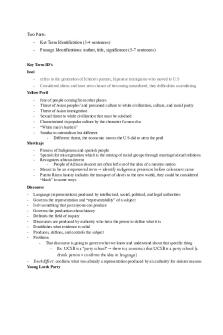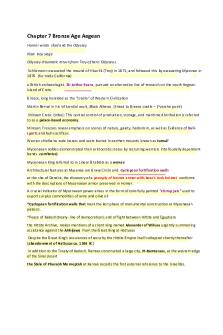Midterm Review - Professor Xiaomei CHEN PDF

| Title | Midterm Review - Professor Xiaomei CHEN |
|---|---|
| Course | Modern Chinese Drama |
| Institution | University of California Davis |
| Pages | 3 |
| File Size | 131 KB |
| File Type | |
| Total Downloads | 43 |
| Total Views | 141 |
Summary
Professor Xiaomei CHEN...
Description
Midterm Review Sheet Key Dates (In Introduction) 1866 Foreign residence in Shanghai built Lyceum Theater Western missionary schools performed biblical stories Imperialism 1879 A Doll’s House, Ibsen is published Literary Production: What Ibsen wanted to write Bound to be different from the reception Reception of Play: how the audience interpreted the play 1907 1st Chinese spoken drama premiered in Japan (The Black Slave Cried out to Heaven), adapted from Harriet Stowe’s novel Uncle Tom’s Cabin 1911-’12 The founding of the Republic of China by the KMT (Nationalists) Headed by Dr. Sun Yansen Became an inspiration for many Chinese writers who were leaning left Qing Dynasty overthrown 1917 The Russian October Revolution (1st Socialist country established) 1919 The New Youth (a progressive? journal) publishes a special issue on Ibsen The Main Event of One’s Life by Hu Shi The 1st original script written by a Chinese playwright Hu Shi published an essay on Ibsenism The beginning of the May Fourth literary movement Hu Shi introduced “Ibsenism” and A Doll’s House for women’s liberation and advocated modern society **The beginning of Chinese Drama Script Historical Periods Republican Period (1911-1949) Founded by the KMT (Nationalists) Supported by Western countries May Fourth Movement (1919) China was part of the Allies (winning side) against Germany But the treaty gave German-held concessions in China (Shandong Peninsula) to Japan, instead of returning it back to China → May Fourth literary movement reflects this sentiment Student demonstration on May 4, 1919 in Tiananmen Square triggered the May Fourth Movement Students were boycotting the signing of the Peace Treaty at the 1919 Versailles Peace Conference End of WWI (1919) The Treaty of Versailles was never officially signed by China “The Spirit of the May Fourth” Promoting science, democracy, and modernization Mainly promoted western models “The Contradiction of the May Fourth Movement” 1. Introduction of Western science, democracy, and modernization is against traditional Chinese Confucian cultural traditions 2. Anti-Imperialist, Anti-Western Ideology preserves some good practice/values of the Chinese culture Lao Chen Went to school in the states and came back confused Lu, Zhipeng Came back to China confused War of Resistance to Japanese invasion on a national scale (1937-’45) The U.S.A. supported China (KMT) Japan surrendered in 1945 This period of time was also the Golden Period Thunderstorm, Cao Yu (1934) 1st performed in Tokyo, Japan and interpreted as a socialist play Cao Yu rejected this political interpretation Said he was only interested in creating Greek drama 1949. Cao Yu revised his play and agreed that it was a leftist play Under Shanghai Eve, Xia Yan (1937) Civil War between KMT and CCP (1945-1949) The PRC Period (1949-Present) PRC = Socialist China Cultural Revolution (1966-’76) A new kind of drama is created Maoist Period (1949-’76) Post-Mao Period (1976-Present) 1976
-
Mao died The Cultural Revolution ended
Political elements are always present in playwrights Key Characters How do these characters push the plot and/or support a major/minor character The Main Event of One’s Life, Hu Shi (1919) Hu Shi studied western philosophy in the U.S.A. New Youth (journal) Hu Shi, “China’s Ibsen” Lu Xun, “What happens to Nora after she leaves home?” -
-
-
-
-
Mr. Tian Mrs. Tian Implicit reference to Chinese students studying abroad and falling in love Fortune Teller Tian Yamei and her lover who studied in Japan A Doll’s House, Ibsen (1879) Nora Torvald Dr. Rank Mr. Krogstad Mrs. Linden Anna-Maria A Doll’s House Part II, Ibsen (2017) Nora Torvald Ana-Maria Nurse/Maid of household Replaces Nora as a mother figure Nora’s daughter Challenges Nora’s own feminist writing After Returning Home, Ouyang Yuqian (1922) Can be interpreted as an anti-western play if performed incorrectly Lu, Zhipeng Wu, Zifang Has never gone outside of the house, but is the wisest Mary Liu Grandmother Open-minded modern woman Mr. Lu’s father Wu Zifang’s father Lao Chen Thunderstorm, Cao Yu (1934) **Scene where Zhou Ping and Lu Sifeng meet up Preface and Epilogue (nurses and children) Zhou Puyuan Zhou Fayi Zhou Ping Zhou Chong -
-
Lu Ma (Lu Shiping) Lu Gui Lu Dahai Regarded as a workers leader Lu Sifeng Under Shanghai Eve, Xia Yan (1937) Xia Yan is a Leftist/Socialist playwright (and an underground Communist member) Every family has their own situations, but it’s all dramatically woven together 1st performance was cancelled 2 days before production date bc the war w/Japan started But Xia Yan was not upset bc the play was meant to build up the war effort Yang Caiyu Lin Zhicheng A practical man Voice of reason Happy that he gets fired Kuang Fu Leaves at the end bc he knows that Yang Caiyu and Lin Zhicheng have feelings for each other Bao Zhen Has no last name
-
-
-
-
-
-
Mr. Huang Jiamei Trained as a schoolteacher, but never got to be one Tries to hide the fact that he’s jobless from his father Mrs. Huang Tries to hide the fact that Huang Jiamei is jobless from Huang’s father Huang’s Father Has the perception that if one has an education, they’ll have a good life. So he worked very hard to raise Huang Jiamei But he figured out the truth Mr. Zhao School teacher Narrates to the readers the different situations of the families People in the middle class suffer the most compared to the rich and the poor → Everyone in the house suffers The rich have money The poor are carefree Happy-Go-Lucky kind of guy Voice of reason Tells Mrs. Zhao to not be so harsh on Xiaobao He has sympathy Well educated man Reads the newspaper The newspaper references the Japanese war Background There was a Japanese concession within Shanghai The Japanese could go out into China and kill Shanghainese and then run back into the concession Newspaper talks about the Japanese soldier that suicided. And then his family sold his body for $34 Shows that the war brought misery to both the Japanese and Chinese Japanese soldiers who fought in the war and their families suffered Like an outsider that can see from a 3rd perspective Has a larger vision Mrs. Zhao Gossips a lot 2 children Shi Xiaobao Husband is a sailor so he’s overseas most of the time → Goes into prostitution in order to survive bc women do not have equal job opportunities Gender/Class politics Xiaobao is stuck She has to keep earning money to send to her Father in the rural areas Women looking down against other women Xiaobao is gossiped against by Mrs. Zhao “Little Tianjin” Gets a cut of Xiaobao’s earnings Li Lingbei Old man living in the attic Lost his son in the war ← More references to the Japanese war Hallucinates that his son comes back as a war hero (Not living in the rational world)
Nora-like characters Tian Yamei Follows her own instinct Wu Zifang (After Returning Home, Ouyang Yuqian (1922)) On the surface, she’s always trapped at home Transcends the traditional boundage; Free spirit liberates her Yang Caiyu (Under Shanghai Eve, Xia Yan (1937))...
Similar Free PDFs

Midterm Review
- 8 Pages

Midterm review
- 11 Pages

Midterm Review
- 12 Pages

ENGL 50 Midterm - Professor Black
- 10 Pages

LS7B Midterm Review
- 1 Pages
Popular Institutions
- Tinajero National High School - Annex
- Politeknik Caltex Riau
- Yokohama City University
- SGT University
- University of Al-Qadisiyah
- Divine Word College of Vigan
- Techniek College Rotterdam
- Universidade de Santiago
- Universiti Teknologi MARA Cawangan Johor Kampus Pasir Gudang
- Poltekkes Kemenkes Yogyakarta
- Baguio City National High School
- Colegio san marcos
- preparatoria uno
- Centro de Bachillerato Tecnológico Industrial y de Servicios No. 107
- Dalian Maritime University
- Quang Trung Secondary School
- Colegio Tecnológico en Informática
- Corporación Regional de Educación Superior
- Grupo CEDVA
- Dar Al Uloom University
- Centro de Estudios Preuniversitarios de la Universidad Nacional de Ingeniería
- 上智大学
- Aakash International School, Nuna Majara
- San Felipe Neri Catholic School
- Kang Chiao International School - New Taipei City
- Misamis Occidental National High School
- Institución Educativa Escuela Normal Juan Ladrilleros
- Kolehiyo ng Pantukan
- Batanes State College
- Instituto Continental
- Sekolah Menengah Kejuruan Kesehatan Kaltara (Tarakan)
- Colegio de La Inmaculada Concepcion - Cebu










